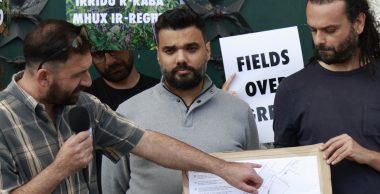At the end of August, during a period of relative lull as the country was getting to terms with the news of a second COVID wave, the government announced the formation of a task force to study the introduction of a living income in Malta.
Moviment Graffitti welcomed this announcement; finally, we’d be looking at the possibility of introducing this much-needed reform and also completing what the tireless Charles Miceli and Joe Bartolo had started years ago.
Research on the topic is very limited and this, in turn, has hindered efforts to bring the matter to the table. We believe this study will be essential in establishing the desirable level of income that allows people of different economic and social backgrounds to live a decent life. Unlike the median income, which is based on the average income in a specific country, the desirable level of income is calculated on the population’s expenses and needs. In order to introduce a serious and holistic reform for a decent living income, the study should establish a living income based on what we spend on food, rent/home loans, healthcare, transportation, education, clothing, as well as our recreation and savings, among others.
Presently, a number of obstacles hold thousands on or below the poverty line from having a living income. These partly stem from low salaries, including but not only the very low minimum wage in Malta, as well as low pensions and inadequate social benefits. These are deep-seated structural issues that need to be addressed before any meaningful reform can commence; studies about a living income proposal also need to identify which segments of the population are not achieving a living income and, most importantly, the reasons why.
Statistics about the incomes of the Maltese are often merciless. As of September last year, the average wage in Malta rose to €19,484 from €18,942 in 2018; this increase, at a rate of half the EU average, equates to a rise of €29 monthly (net of tax).
In July this year, Eurostat revealed that our minimum wage lags way behind the EU average, standing at €762 monthly versus the Union’s €924. In this table, we rub shoulders with member states such as Portugal and Greece, which have been repeatedly mauled by a hawkish Troika and spiralling public debt, and, basically, every member state to have spent a lifetime behind the Iron Curtain.
Unlike most of our ‘running mates’, Malta could boast budgetary surpluses and unrivalled economic growth; if you needed further proof that trickle-down economics are only lazy promises of prosperity, these figures show how none of all this growth makes it to the tables of those at the bottom.
In fact, the approach should work the other way round. Raising the minimum wage would cause rises in the salaries of other low-paid jobs; this, in itself, would be one big step towards achieving a living income, although it will take more than just that.
Statistics at hand, considering the golden period of our economy, it’s hard to fathom how the government and employers, hand in glove, often insist that Malta doesn’t afford a higher minimum wage. Same statistics at hand, Malta has the highest rate of economic growth in Europe and one of the lowest minimum wages in the EU.
Achieving the living income has also been made harder in recent years by the uncontrolled rise of the property market, whereby buying and renting has become impossible for quite a chunk of the population, particularly those who live on their own or have a family.
Abuse in the rental sector is rife and has a particularly malicious way of dealing cards to tenants, who have often found themselves evicted or cheated without too many niceties. The rent law reform – which has been shot at with no quarter by the MDA and its cohort of estate agents and landlords – was a step in the right direction, although I believe the unbridled mushrooming of rent prices still needs to be addressed since it has wrought damage to thousands of people, mostly those who have no possibility to finance their own property.
On Workers’ Day this year – a sombre day off in semi-lockdown – we spoke of how we believe the post-COVID economy is an opportunity to build a socially just economy. First of all, a sudden and immediate return to the normal economy is not only impossible but not really desirable. Those who complained of exploitation, inequality, injustice and environmental degradation up until the end of February, while yearning for a return to normality, haven’t forgotten the ills of neoliberalism, which hasn’t sat exactly on its laurels throughout the pandemic (fancy a pizza delivery?)
Wealth should be shared more equally, putting workers and their quality of life at the centre of the focus. Better conditions and higher wages (especially minimum wages) should be accompanied by a more just taxation system that taxes the super-earners and their huge assets. As we’re witnessing during this pandemic, it is the workers, the frontliners on a lower income, who are striving to protect our quality of life. The government has a moral duty to redistribute wealth in a just manner and provide workers with a bigger, more deserved share of the wealth they are producing. Creating a decent living income would be a first step in this regard for a government that occasionally remembers to use “socialism” in its propaganda.
Wayne Flask is a member of Moviment Graffiti.




